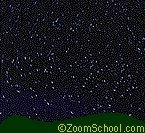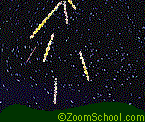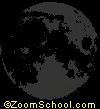A list of astronomy words from the Little Explorers Picture Dictionary in English.
Astronomy-Related Words
Asteroids are tiny planets that mostly orbit between Mars and Jupiter.
The asteroid belt is a doughnut-shaped concentration of asteroids that orbit the Sun between the orbits of Mars and Jupiter.
An astronaut goes up into space to explore.
Astronomers are people who study astronomy and learn about objects in the universe, like stars and planets.
Astronomy is the science that studies the universe.
The atmosphere is the gas that surrounds a planet.
Everything is made up of tiny atoms.
Auroras are beautiful lights in the near-polar sky.
The Big Dipper is a group of 7 stars contained in the Northern Hemisphere constellation Ursa major (the Great Bear).
A billion is a thousand million. The Earth is billions of years old. 1,000,000,000.
A comet is the a small, icy object that orbit the Sun. It’s tail always points away from the sun.
A constellation is a group of stars that we see in the sky. They are not necessarily located together in space, but looks as though they are from Earth.
A crescent moon is smaller than a half moon.
The Earth is the third planet from the sun. It’s where we live!
An eclipse happens when the moon blocks out light from the sun or the Earth’s shadow goes across the moon.
A falling star is not a star; it is a meteor (made of rock and/or iron) which is burning up in the Earth’s atmosphere.
A full moon appears as an entire circle in the sky.
A galaxy is an enormous group of stars.
A gibbous moon is between a half moon and a full moon.
A half moon looks like half a circle.
Jupiter is the largest planet in our solar system and the fifth planet from the sun.
The Little Dipper is a group of stars in the constellation Ursa minor (the Little Bear). This group of stars ends at Polaris, the pole star of the Northern Hemisphere.
Mars is a reddish planet and the fourth planet from the sun. It is the planet that comes closest to the Earth.
Mercury is a moonless planet; it is the planet closest to the Sun.
A meteor is a meteoroid that has entered the Earth’s atmosphere, usually making a fiery trail as it falls. It is sometimes called a shooting star. Most burn up before hitting the Earth.
A meteorite is a meteor that has fallen to Earth. Meteorites are made of stone, iron, or stony-iron.
Meteoroids are tiny stones or pieces of metal that travel through space.
A meteor shower is when a lot of meteor fall through the atmosphere in a short time.
The Milky Way is a bright line of stars stretching across the night sky.
Our solar system is in the Milky Way galaxy. We can see the Milky Way as a band of stars in the night sky.
The Earth has one moon. The moon has no atmosphere. The same side of the moon always faces the Earth.
A nebula is a cloud of gas and dust in space.
Neptune is the eighth planet from the Sun. This frozen planet has 8 moons.
The north star is a star that is located almost due north and is useful for navigation. Polaris is currently the pole star of the Northern Hemisphere.
An observatory is place where people observe the skies, using a device like a telescope.
The Moon orbits the Earth. The Earth orbits the Sun.
As the moon circles the Earth, the shape of the Moon appears to change. The phases of the Moon are: the new moon, waxing crescent, first quarter, waxing gibbous, full moon, waning gibbous, last quarter, and waning crescent.
Eight planets and one dwarf planet orbit our Sun.
Planetariums put on star shows that teach astronomy.
Pluto is a dwarf planet that is uaually farther from the Sun than any of the planets (Pluto was considered to be a planet until 2006). Pluto’s moon is called Charon.
A quasar is a distant energy source in space which gives off large amounts of radiation.
Satellites orbit the Earth.
Saturn is the sixth planet from the Sun. It has beautiful rings.
A shooting star is not a star; it is a meteor (made of rock and/or iron) which is burning up in the Earth’s atmosphere.
In our Solar System, eight planets, one dwarf planet, many asteroids, comets, and other objects orbit around our sun.
The space shuttle flies into space and back down again, carrying people and equipment.
Astronauts wear spacesuits when they walk in space.
Each of the stars we see in the night sky is another sun, but much farther away than our sun.
The Sun is a medium-sized yellow star in our Solar System. We get our light and most of our energy from the Sun.
Uranus is the seventh planet from the Sun. Uranus looks bluish and is covered with clouds. It has an unusual, tipped axis, which gives it extreme seasons.
Venus is the second planet from the Sun and the hottest planet in our Solar System. From the Earth, Venus is the brightest object in the sky except for the Sun and the Moon.
The zodiac is a band of 12 constellations (groups of stars) in the sky, including Capricorn, Aquarius, Sagittarius, Scorpio, Libra, Virgo, Leo, Cancer, Gemini, Taurus, Aries, and Pisces.
For a more in-depth Astronomy Dictionary, click here.



